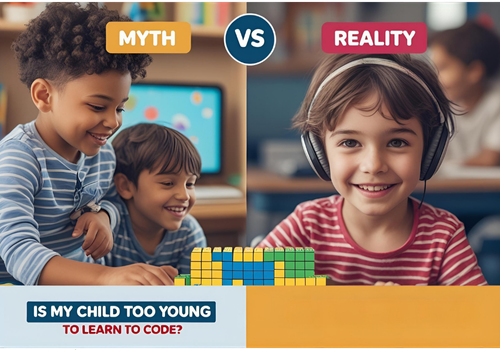Myth vs. Reality: Is My Child Too Young to Learn to Code?

Myth vs. Reality: Is My Child Too Young to Learn to Code?
Is your child ready for coding? It’s a question many parents ask as they navigate the ever-evolving digital world. Coding is often imagined as something suited only for older kids—maybe teens hunched over keyboards, typing away at complicated strings of code. But the truth is, coding today is far more accessible, creative, and fun—especially for young learners.
In fact, the earlier kids are introduced to coding, the more natural it becomes. With the right tools and guidance, even children in Grade 1 or 2 can begin learning how to think logically, solve problems, and express themselves through code.
We use visual platforms, storytelling, and hands-on projects to help children learn in a playful and pressure-free way. Our expert instructors focus on nurturing curiosity and confidence, not just teaching tech skills. We’re not preparing kids to become engineers tomorrow—we’re helping them discover new ways of thinking and expressing themselves today.
Myth: Coding is Only for Older Kids Who Can Type
Many parents believe that coding is too technical or too advanced for young children. There's a common image of programming as a serious activity, full of math-heavy logic and keyboard commands that only older students can handle. This leads to the idea that we should wait until a child is older before introducing them to these concepts. But that mindset misses what coding for kids is really about today.Reality: The Best Time to Start is Now—With the Right Tools
Young children learn best when they play. And thanks to modern, visual-based platforms like ScratchJr or Blockly, even first and second graders can learn to code by dragging and dropping blocks—just like building with LEGO. These platforms allow kids to create animations, stories, and games while learning the logic behind computer programming, all without needing to type. Starting early with play-based coding helps children:- Develop a Creative Mindset: Kids learn to turn an idea into a plan and then into something real—like an animated story or interactive game.
- Build Problem-Solving Skills: They figure out how to fix things when they don’t work, building resilience and logical thinking.
- Boost Confidence: Every time their code works, they feel a sense of achievement, which builds self-esteem.
- Learn Computational Thinking: They begin to understand sequencing, patterns, loops, and conditionals—all foundational skills not just in computing, but in life.
Our Approach: Making Coding Accessible, Fun, and Age-Appropriate
At Core Code Learning, we believe that kids can do incredible things when given the right environment. Our beginner-level courses for Grades 1–2—such as "Digital Explorers" and "Game Makers"—are built specifically for younger minds. [Our Curriculum]We use visual platforms, storytelling, and hands-on projects to help children learn in a playful and pressure-free way. Our expert instructors focus on nurturing curiosity and confidence, not just teaching tech skills. We’re not preparing kids to become engineers tomorrow—we’re helping them discover new ways of thinking and expressing themselves today.


